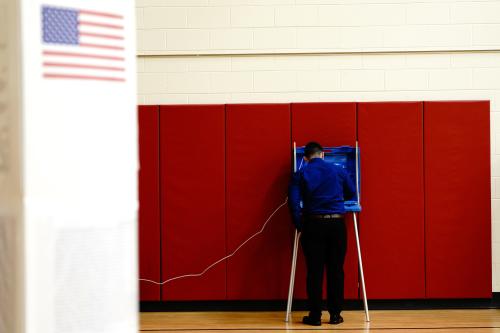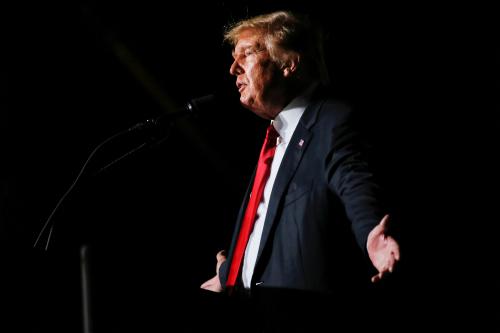It is never a good sign when a candidate is forced to replace his campaign manager less than four months before the election. In Donald Trump’s case, it is an indication that his reelection campaign is in a crisis so pervasive that it threatens to take down not only his presidency but his entire party.
At the national level, former Vice President Joe Biden now leads President Trump by an average of about 9 percentage points according to FiveThirtyEight, which adjusts for the timing and quality of individual surveys. Focusing on the highest-quality surveys released during the past three weeks, the picture gets even darker for the president.
TABLE 1
| Biden | Trump | Margin | |
| Quinnipiac | 52 | 37 | 15 |
| Monmouth | 53 | 41 | 12 |
| NBC/WSJ | 51 | 40 | 11 |
| Suffolk/USA Today | 53 | 41 | 12 |
| Marist | 52 | 44 | 8 |
| CNBC/Hart | 47 | 38 | 9 |
| Siena/New York Times | 50 | 36 | 14 |
| AVERAGE | 51.1 | 39.6 | 11.5 |
A 9-point win for Biden would give him the largest margin of victory since Ronald Reagan, while an 11.5-point win would exceed even Reagan’s victory margin over one-term president Jimmy Carter in 1980.
The outlook for the president is no brighter in the most closely contested states, whose results will determine the outcome in the Electoral College. Table 2 compares the polling averages according to FiveThirtyEight and Real Clear Politics with the results in 2016. A positive number indicates a Trump lead in 2020 or victory in 2016; a negative number indicates a lead for Biden in 2020.
TABLE 2
| RealClearPolitics poll average | FiveThirtyEight poll average | 2016 | |
| The Blue Wall and Midwest | |||
| Michigan | -7.7 | -9.1 | +0.2 |
| Pennsylvania | -7.8 | -7.7 | +0.7 |
| Wisconsin | -6.0 | -7.6 | +0.8 |
| Iowa | +1.0 | +0.7 | +9.4 |
| Ohio | -1.0 | -2.2 | +8.1 |
| The South and Southwest | |||
| North Carolina | -2.0 | -2.9 | +3.7 |
| Florida | -6.4 | -6.8 | +1.2 |
| Georgia | +0.5 | -0.9 | +5.1 |
| Texas | +0.2 | -0.3 | +8.1 |
| Arizona | -3.8 | -2.6 | +3.6 |
| Trump “expand the field” states | |||
| Minnesota | -16.0 | NA | -1.5 |
| New Hampshire | -7.0 | -8.0 | -0.4 |
| Nevada | NA | -8.5 | -2.4 |
Here are the takeaways from Table 2:
- President Trump is trailing by substantial margins in all three “Blue Wall” states—Michigan, Pennsylvania, and Wisconsin—which he narrowly carried in 2016, and he is running no better than even with Joe Biden in two Midwestern states—Ohio and Iowa—which he won by substantial margins four years ago.
- Although he won every contested race in the South in 2016, he is trailing badly in Florida, in trouble in North Carolina and Arizona, and fighting to prevail in Georgia and Texas, where he won easily four years ago.
- Earlier this year, the Trump campaign hoped to expand the field into Minnesota, New Hampshire, and Nevada, states the president lost by narrow margins in 2016. As of now, it does not appear that any of these states is in play. It is the Biden campaign that is widening the contest, forcing the Trump campaign to defend states Republican presidential candidates have long taken for granted.
President Trump’s weak political standing is having an impact on other Republican candidates. It has created tougher-than-expected battles for Republican Senate incumbents in Arizona, Georgia, Iowa, and North Carolina, and it is dimming the hopes of the Republican challenger in Michigan. The president’s double-digit deficits in Colorado and Maine, both of which Hillary Clinton carried by smaller margins in 2016, is making life more difficult for Republican incumbents in these states as well.
President Trump’s impact is also apparent in two deep-Red states that should be slam-dunks for Republican Senate candidates. In 2016, Trump prevailed in Montana by 20.4 percentage points and in Kansas by 20.6 points. As of now, his lead in both these states is down to 9 points. The Democrats’ Senate candidate in Montana, the current governor, is running about even with the incumbent Republican senator, and Kansas Republicans openly worry than if they nominate a Trump-style populist conservative in their primary, they could end up with a Democratic senator for the first time since 1932.
President Trump is reshaping public assessments of the two major parties to the disadvantage of the Republicans. A Gallup survey released on July 16 found that the 2-point edge in party affiliation the Republicans enjoyed as recently as January of 2020 had turned into an 11-point Democratic advantage by the end of June. The bulk of this Republican erosion has occurred during the past two months.
For years, majorities of Americans have rendered negative judgments on President Trump’s character and personal conduct while giving him high marks for his management of the economy. But circumstances have changed. Fewer Americans approve of his handling of the COVID-19 pandemic, which pulled the country into a deep recession. For the first time ever, a high-quality survey has found a majority trusting Joe Biden to manage the economy better than Donald Trump, and they prefer him over the president as the country’s pandemic manager by a margin of 59 to 35.
The more the 2020 election turns into a referendum on President Trump as crisis manager, the worse the outcome will be for him. As recently as June 7, 47% of Americans thought the coronavirus situation was getting better, compared to just 30% who thought it was getting worse. Just three weeks later, after the massive upsurge in COVID-19 cases, the share of Americans who thought the situation was getting better fell by half to just 23% while the share who thought it was getting worse had more than doubled to 65%. An ABC/Washington Post poll released on July 17 found that approval of the president’s handling of the pandemic fell from 51% in March and 46% in May to just 38% in mid-July, while disapproval rose from 45% in March to 53% in May and 60% today.
Americans are losing hope, at least for the near-term. Seventy-four percent expect the coronavirus disruption that has upended their lives to last through the end of 2020 or longer. Fifty-six percent worry about catching COVID-19, the highest since April, and 72% say that it is better to hunker down at home rather than resuming normal activities. Until these attitudes become more positive, it is hard to see how the economy can regain its vigor.
Have President Trump’s chances of reelection disappeared altogether? Not quite. If a vaccine demonstrates its safety and effectiveness by early fall and new cases begin to drop, the public mood could shift. The president could admit error and change course in both substance and tone, as savvy Republican analysts have recommended. Joe Biden could commit a gaffe as damaging as Hillary Clinton’s “basket of deplorables” comment, or he could perform badly enough in the debates to raise doubts about his fitness for the presidency. But as things now stand, President Trump would have better odds of drawing to an inside straight, and changing campaign managers won’t help him very much.







Commentary
Trump’s campaign is in freefall, with COVID-19 on voters’ minds
July 17, 2020